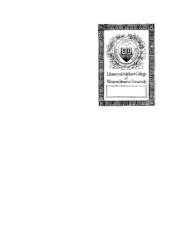Create successful ePaper yourself
Turn your PDF publications into a flip-book with our unique Google optimized e-Paper software.
15<br />
As both Ovid 3t and Macrobius,35 however, tell us that it was<br />
offered to Jupiter, and Macrobius says a flamine, it appears<br />
obviously impossible that any other flamen or priest of any sort<br />
than that of Jupiter can be intended, especially as Ovid's epithet<br />
castus sacerdos expressly fits the character of the Flamen<br />
Dialis. I fully agree then with Professor Fowler in his hypothesis<br />
that the Flamen Dialis, because of his extreme antiquity in<br />
Latin religious history and his superintendence over the rites of<br />
the primitive Indo-European sky-god, can have had no special<br />
connection with Optim:us Maximus, because this Jupiter was<br />
political and a late importation from Etruria. It is thus impossible<br />
for the sacra Idulia to have been offered both at this temple<br />
and by this priest. I cannot, however, reject the priest, for the<br />
passages above noted from Ovid and Macrobius are too con·<br />
clusive in support of his connection with the sacra Idulia. I<br />
must, therefore, reject the temple, for the words in magni lovis<br />
aede are by no means a certain reference to the aedes of the<br />
great political god, any more than to one of the other Jupiter<br />
cults in Rome. ss<br />
.. Fasti I, 56; 587-S.<br />
.. I, 15, 16 (see n. 25 above).<br />
.. I cannot see how the Etruscan etymology which Macrobius gives for<br />
the words "Ides" and ovis Idulis can be used as an argument against the<br />
genuinely Latin origin of the Roman festival. Even if his etymology<br />
be correct, there is no reason to doubt that the worship of the sky-god<br />
on the day of the futl moon can easily have antedated any name that<br />
later crept into the calendar for that day. Macrob. I, 15, 14: Iduum<br />
porro nomen a Tuscis, apud quos is dies Itis vocatur, sumptum est.<br />
Item autem itli interpretantur lovis fiduciam, nam cum lovem accipiamus<br />
lucis auctorem . . . iure hic dies lovis fiducia vocatur, cuius lux non<br />
finitur cum solis occasu, sed splendorem diei et noctem continuat inlustrante<br />
luna; . . . diem igitur qui vel nocturnis caret tenebris lovis<br />
fiduciam Tusco nomine vocaverunt; unde et omnes Idus lovis ferias<br />
observandas sanxit antiquitas"; and I, IS, 16: "quam (ovem Idulem)<br />
hoc nomine vocant Tusci". A paratlel rite may wetl have existed among<br />
the Etruscans, but it seems very improbable that the word "Ides" was<br />
derived from the Etruscan. Varro (L. L., VI, 28), says: "Idus ab eo<br />
quod Tusci itus vel potius quod Sabini idus dicunt". Corssen (Ober die<br />
Sprache der Etrusker, Vol. II, pp. 237-238), gives a number of corresponding<br />
roots from the Indo-Germanic languages, atl containing the idea<br />
of brightness or heavenly light. Cf. Walde (Lateinisches etymologisches<br />
Worterbuch, p. 375).
















